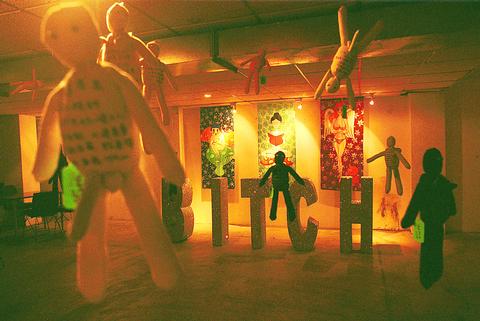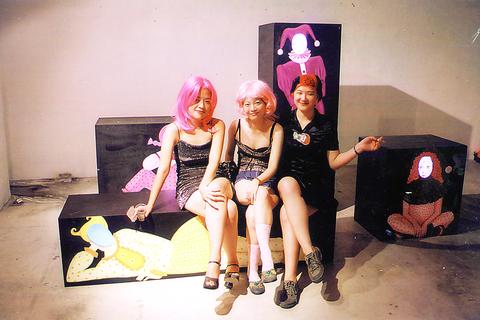For `More' is Never Enough, 30-something women have decided to pose themselves as spice girls. Their purpose is to question the artificial and materialistic values that society has imposed on them. As they have found that their personal needs and voices are neglected, they have decided to embrace the values they despise.
So they've dressed up to look something like the Cindy Lauper who sang "Girls Just Want to Have Fun." And the clothes are just part of it. They've also sent out invitation cards that say "cash and diamonds welcome," and they've placed a large photo of themselves in wedding dresses right at the entrance of the Front Art Cafe.
But make no mistake. This party of three, Charlene Shih, Kay Li and Jeyni Tsay, are serious artists. Even though they're superficial and gaudy on the outside, they are talented and well-versed in their field. What's more, they dare to speak their minds and challenge social norms.

PHOTO: CHIANG YING-YING, TAIPEI TIMES
For the show, they chose the Front Art Cafe because it is a multifunctional venue with exhibition space, a bar and a restaurant. They found it more than fitting for their experimental artworks, which consist of five separate installations.
Li's installation is called Cotton Candy. For it, she gathered cotton into heaps and clouds and spread fetish-like figures made of clay among it. She said the clay figures, each of which was modeled with both male and female sex organs (penises and breasts), present a situation of uni-sex or androgyny. The implications are twofold.
On a personal level, Li, who is 33 and single, rationalized that if humans were uni-sex, then they wouldn't need love from the opposite sex. That would eradicate the problem of loneliness. The second message that Li tries to get across is that we are all like ants, working hard and following strict social conventions. According to her work's visual metaphor, ants are what the brownish clay figures look like amidst the fluffy cotton. Moreover, these figures have no individuality, no personal voice and none of their desires are ever fulfilled.

PHOTO: CHIANG YING-YING, TAIPEI TIMES
Jeyni Tsay, 30, has offered up two installation pieces. The one at the entrance of the venue is somewhat provocative, as it consists of a plastic manikin with its face buried in water and covered up by a black hood. Words run all over the manikin's body, and if you take a close look, you'll see that they are a hundred reasons for seeking death. Tsay said that the reasons are actually trivial to her even though they're indispensable to the forming of social judgements.
The contradiction bothers her. One says: "Even though I know as a creative artist I do not make enough money, I still insist on going on." Another says: "After such long schooling, I have become a dumb person. When it comes to interpersonal skills, I am still at the stage of kindergarten."
The second piece by the introverted and somewhat repressed Tsay is a bit more colorful. The Clown Series consists of four wooden boxes painted with differently positioned and colorfully rendered crowns. But instead of faces, there are holes which let through to video screens. On three of the screens, the clowns are murmuring in a garbled language that nobody can understand. The final screen is blank, as if this clown has given up speaking altogether.

PHOTO: CHIANG YING-YING, TAIPEI TIMES
Tsay says that she identifies with the clowns, who clumsily cry out loud, but nobody hears. Laden with values that differ from those of her family, Tsay uses the work to vent her frustration at being ignored.
The third woman is Shih. She is a long time Californian resident who carries a Hollywood air: direct, cynical and snobbish. Her multimedia assemblage titled Bitch glitters with flashy colors and three cartoonish pictures of women. Each represents a different female stereotype: one with a good figure, one academic and the last one innocent.
Shih said that she's often called a "bitch" and has even developed her own interpretation of the word. "Bitch used to refer to prostitutes and low class women," she said, "but recently it has been adapted to refer to independent women with opinions of their own. So now it's negative and positive at the same time."

PHOTO: COURTESY OF KAY LI, TAIPEI TIMES
Another installation by Shih, Take me Home, is sarcastic all over. Shih made 40 rag dolls and hung them from the ceiling. Each has a price tag holding a quantity between NT$200 and NT$5,500. The tags also contain personal ad-like descriptions in Chinese and English. "These are all descriptions of my friends and family," said Shih.
One doll with a price tag of NT$3,000 is marked: "Studies in France. Dancer. No property. Owns a car. In debt. Orphan. Cheerful. Easygoing. 38 years old. Height 5' 11." Ironically, the fact that the man is an orphan gets him a higher price, commented Li, "because most women do not want to live under the shadow of a dominating mother-in-law."
Another doll has a price tag of NT$200 that reads: "High school grad. No regular jobs. In debt. Divorced. Has one son. Irresponsible. A big looser. 5'9 tall. 40 years old."
Shih revealed that it is her cousin. "I hope he sees this and thinks it over," she said.
Having a successful career in which she snapped in NT$1 million at last year's Taipei Film Festival, and a happy marriage to a music producer in California, Li said that nevertheless, in this miserable world, we are all confined by worldly standards and judgements.
The three women first met when they were classmates at Otis College of Art and Design in California. They painted the town red during their stay there and did not have any culture shock; instead, local critics said they "shocked the culture" by venturing to be different, funky, outrageous and funny.
In a statement released by Tsay for the show, she said the three first had the idea to hold a joint exhibition a year ago when they were still at Otis. At the time, they had nothing, no fortune, no fame and no relationships. Lamenting at their sorrowful status, they decided to name their future exhibition `More' is Never Enough, which in Chinese actually means "not having what we should have."
"As time goes by, the things we did not care about and even despised are becoming more important to us," said Tsay. "Even though we don't want to admit it, we want to marry rich and maintain young-looking figures. We have to admit that we are getting old, which is why we are becoming tacky and starting to crave things that do not feed the spiritual."

On April 26, The Lancet published a letter from two doctors at Taichung-based China Medical University Hospital (CMUH) warning that “Taiwan’s Health Care System is on the Brink of Collapse.” The authors said that “Years of policy inaction and mismanagement of resources have led to the National Health Insurance system operating under unsustainable conditions.” The pushback was immediate. Errors in the paper were quickly identified and publicized, to discredit the authors (the hospital apologized). CNA reported that CMUH said the letter described Taiwan in 2021 as having 62 nurses per 10,000 people, when the correct number was 78 nurses per 10,000

As we live longer, our risk of cognitive impairment is increasing. How can we delay the onset of symptoms? Do we have to give up every indulgence or can small changes make a difference? We asked neurologists for tips on how to keep our brains healthy for life. TAKE CARE OF YOUR HEALTH “All of the sensible things that apply to bodily health apply to brain health,” says Suzanne O’Sullivan, a consultant in neurology at the National Hospital for Neurology and Neurosurgery in London, and the author of The Age of Diagnosis. “When you’re 20, you can get away with absolute

May 5 to May 11 What started out as friction between Taiwanese students at Taichung First High School and a Japanese head cook escalated dramatically over the first two weeks of May 1927. It began on April 30 when the cook’s wife knew that lotus starch used in that night’s dinner had rat feces in it, but failed to inform staff until the meal was already prepared. The students believed that her silence was intentional, and filed a complaint. The school’s Japanese administrators sided with the cook’s family, dismissing the students as troublemakers and clamping down on their freedoms — with

As Donald Trump’s executive order in March led to the shuttering of Voice of America (VOA) — the global broadcaster whose roots date back to the fight against Nazi propaganda — he quickly attracted support from figures not used to aligning themselves with any US administration. Trump had ordered the US Agency for Global Media, the federal agency that funds VOA and other groups promoting independent journalism overseas, to be “eliminated to the maximum extent consistent with applicable law.” The decision suddenly halted programming in 49 languages to more than 425 million people. In Moscow, Margarita Simonyan, the hardline editor-in-chief of the